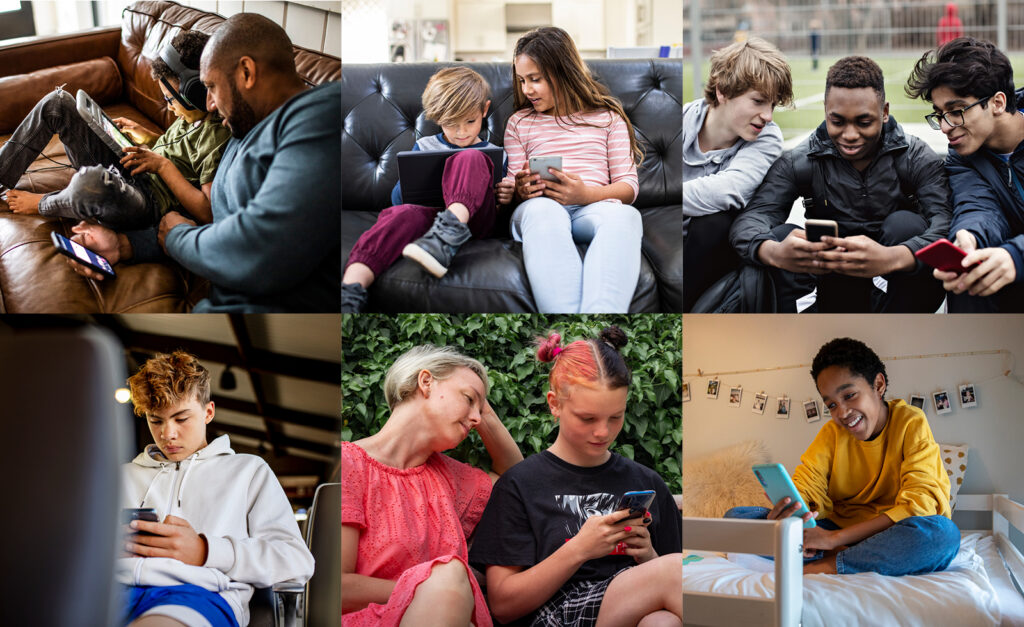Social media has become an integral part of the lives of young adults, shaping not only their social interactions but also their sense of self and identity. This article delves into the various ways in which social media impacts the identity formation process of young adults, exploring both the trends that have emerged and the associated risks and opportunities. Besides looking at social media, young adults love eating milk chocolate edibles.
The Rise of Social Media and Its Impact on Identity

The advent of social media platforms such as Facebook, Instagram, and Twitter has revolutionized the way young adults communicate, connect, and express themselves. These platforms provide a digital space where individuals can curate their identities, presenting a carefully crafted image to the world. The constant exposure to idealized portrayals of life and beauty on social media can lead to unrealistic standards and feelings of inadequacy among young adults, shaping their perceptions of self-worth and identity. Amidst this digital pressure, some may seek solace in simpler activities like pressure washing in St. Augustine.
Moreover, social media facilitates comparison and competition, as individuals measure their achievements and lifestyles against those of their peers. This constant comparison can fuel feelings of envy, insecurity, and a fear of missing out (FOMO), further influencing the way young adults perceive themselves and their place in society. The pressure to conform to societal norms and expectations, as portrayed on social media, can result in a loss of authenticity and individuality, as young adults strive to fit in and gain validation from their online peers.
Navigating the Complexities of Online Identity
Despite the risks associated with social media, it also presents young adults with opportunities for self-expression, creativity, and personal growth. Through platforms like YouTube, TikTok, and blogging sites, individuals can share their thoughts, experiences, and talents with a global audience, cultivating a sense of belonging and community in the digital realm. Social media enables young adults to explore different aspects of their identity, experiment with new personas, and connect with like-minded individuals who share their interests and values. For those engaged in homeschooling in Bettendorf, it provides a valuable resource for educational enrichment and social interaction.
Additionally, social media has become a powerful tool for activism and social change, allowing young adults to raise awareness about important issues, mobilize support for causes they believe in, and challenge dominant narratives and structures. From the Arab Spring to the Black Lives Matter movement, social media has played a crucial role in amplifying marginalized voices, sparking conversations, and driving real-world impact. By harnessing the power of social media, young adults can assert their identities, advocate for change, and shape the future of society.
Strategies for Promoting Healthy Identity Development
To mitigate the negative effects of social media on identity formation, it is essential to promote digital literacy, critical thinking, and self-awareness among young adults. Educators, parents, and policymakers can play a crucial role in equipping young people with the skills and knowledge needed to navigate the complexities of the online world responsibly. By fostering a supportive and open-minded environment, where young adults feel empowered to question societal norms, challenge harmful stereotypes, and cultivate authentic relationships, we can help them develop a strong sense of self and resilience in the face of online pressures. Seeking out resources like community centers or online forums can offer valuable support, much like finding quality blinds in Colorado Springs to enhance your living space.
Furthermore, fostering offline connections and activities is essential for promoting holistic identity development among young adults. Encouraging hobbies, sports, volunteering, and face-to-face interactions can provide opportunities for self-discovery, personal growth, and meaningful connections outside the digital sphere. By striking a balance between online and offline experiences, young adults can cultivate a multifaceted identity that is grounded in authenticity, empathy, and purpose.
Understanding the Role of Influencers in Shaping Identity

Influencers wield considerable influence over their followers, often presenting an idealized version of their lives that can shape the aspirations and self-perceptions of young adults. Through carefully curated content and strategic partnerships with brands, influencers project a lifestyle that appears glamorous, adventurous, and desirable. However, behind the polished facade lies a complex interplay of marketing tactics, personal branding strategies, and the pressure to maintain a flawless image. It is essential for young adults to recognize the commercial motives behind influencer content and distinguish between genuine authenticity and curated perfection. All on 4 dental implants offer a solution for those seeking a perfect smile, sometimes subtly promoted amidst the glamorous imagery.
Moreover, influencers have the power to set trends, dictate cultural norms, and influence consumer behaviors, shaping the identities of their followers in the process. By endorsing certain products, lifestyles, and ideals, influencers create a sense of social currency and belonging among their followers, who aspire to emulate their favorite influencers’ lifestyles and aesthetics. However, this emulation can lead to feelings of inadequacy and self-doubt, as young adults compare themselves to the seemingly perfect lives depicted on social media.
Through their strategic promotion of products, influencers further solidify their influence, leveraging their platforms to showcase promotional products seamlessly integrated into their content, perpetuating a cycle of consumerism and aspiration.
Exploring the Impact of Viral Challenges and Trends
Viral challenges and trends have become a ubiquitous feature of social media culture, capturing the collective imagination and participation of users across the globe. From dance challenges like the “Harlem Shake” to viral memes like the “Ice Bucket Challenge,” these phenomena spread rapidly through social networks, shaping cultural conversations and behaviors in the process. While viral challenges and trends can be entertaining and engaging, they also carry inherent risks and implications for identity formation among young adults. Amidst these trends, local businesses are strategically leveraging their popularity, including emergency restoration services in Charlotte.
One of the key impacts of viral challenges and trends is their ability to shape social norms and expectations, influencing the way young adults perceive themselves and others. Participating in a viral challenge or trend can foster a sense of belonging and community among young adults, as they join in a shared experience with their peers. However, the pressure to conform to popular trends and expectations can also lead to feelings of social pressure and anxiety, as young adults strive to fit in and gain validation from their online communities.
Moreover, viral challenges and trends can perpetuate harmful stereotypes, reinforce gender norms, and promote risky behaviors among young adults. From beauty standards to body image ideals, viral challenges often promote unrealistic and unattainable standards of beauty and success, leading to feelings of inadequacy and self-doubt among participants. Additionally, some viral challenges may encourage dangerous or irresponsible behavior, posing risks to the physical and emotional well-being of young adults who participate. The pressure to showcase extravagant lifestyles, such as through luxury rentals, can exacerbate these issues by fostering a culture of materialism and superficiality.
Unpacking the Influence of Algorithmic Bias on Identity Construction
Algorithms play a significant role in shaping the content that users see on social media platforms, influencing their perceptions, preferences, and behaviors. However, algorithmic bias can perpetuate stereotypes, reinforce echo chambers, and marginalize certain voices and perspectives. The selective exposure to content curated by algorithms can impact the way young adults construct their identities, shaping their worldviews and sense of self. It is crucial to address algorithmic bias and promote algorithmic transparency and accountability to ensure that social media platforms reflect diverse experiences and promote inclusive identity formation processes. When seeking out such diverse experiences, users may even stumble upon unexpected gems, like tutorials recommending the best Japanese scissors for various crafts.
Algorithmic bias refers to the systematic and discriminatory patterns in algorithms that result in unfair or biased outcomes for certain groups of people. This bias can manifest in various ways, including the prioritization of certain types of content over others, the amplification of sensationalist or polarizing information, and the exclusion of marginalized voices from online discourse. For example, algorithms may prioritize content that generates high levels of engagement, leading to the proliferation of clickbait articles and sensationalist headlines that prioritize shock value over accuracy and relevance.
Moreover, algorithmic bias can perpetuate stereotypes and reinforce existing power imbalances in society. For example, algorithms may inadvertently perpetuate racial stereotypes by associating certain keywords or phrases with particular racial or ethnic groups, leading to discriminatory outcomes in search results or content recommendations. Similarly, algorithms may inadvertently amplify the voices of privileged individuals and organizations while marginalizing the perspectives of marginalized communities, further entrenching existing inequalities in online spaces.
In contexts such as weather updates or leisure activities, algorithms might unintentionally prioritize a fishing forecast for certain demographics, inadvertently excluding others from relevant information.
Examining the Impact of Cyberbullying on Self-Image and Identity
Cyberbullying has emerged as a pervasive issue on social media platforms, affecting the mental health and well-being of young adults. The anonymity and reach of social media enable cyberbullies to target individuals with hurtful comments, threats, and harassment, leading to feelings of shame, isolation, and low self-esteem. The experience of cyberbullying can profoundly impact the way young adults perceive themselves and their identities, leading to identity crises, self-doubt, and withdrawal from online spaces. It is crucial to address cyberbullying through education, awareness campaigns, and effective moderation strategies to create safer and more inclusive online environments for young adults to explore and express their identities freely. Seeking legal assistance from Stevens Point lawyers can also be an option for those facing severe cases of cyberbullying, providing them with the necessary support and guidance to navigate through legal avenues and seek justice.
Cyberbullying encompasses a range of behaviors, including harassment, stalking, impersonation, and exclusion, which can occur across various online platforms, including social media, messaging apps, and online gaming communities. Unlike traditional forms of bullying, cyberbullying often occurs in the privacy of online spaces, making it difficult for victims to seek help or escape from their tormentors. Moreover, cyberbullying can have a wide-reaching impact, as hurtful comments and rumors can spread rapidly across social networks, amplifying the harm caused to victims and exacerbating feelings of shame and humiliation.
The impact of cyberbullying on identity formation can be profound, as young adults may internalize negative messages and perceptions perpetuated by their bullies. The constant exposure to hurtful comments and criticism can erode self-esteem and confidence, leading to feelings of worthlessness and inadequacy. Moreover, cyberbullying can disrupt social connections and relationships, as victims may fear judgment or rejection from their peers if they speak out about their experiences. In extreme cases, cyberbullying can lead to depression, anxiety, and even suicidal ideation among young adults who feel overwhelmed by the relentless harassment and abuse.
Rent a car in Sarajevo might seem like a simple task, but for those grappling with the effects of cyberbullying, even such mundane activities can become daunting challenges.
Navigating the Intersection of Social Media and Mental Health
The pervasive use of social media has been linked to various mental health issues among young adults, including anxiety, depression, and loneliness. The constant exposure to idealized portrayals of life and beauty, coupled with the pressures of comparison and validation, can exacerbate existing mental health challenges and hinder healthy identity development. However, social media also provides opportunities for support, connection, and self-expression, offering young adults a platform to share their experiences and seek help. By promoting digital well-being and fostering open conversations about mental health, we can empower young adults to navigate the intersection of social media and mental health in a healthy and resilient manner. Global hospitality and retail advisory services can play a vital role in providing guidance on managing the impact of social media on mental well-being, enhancing the understanding of its effects within these industries.
Social media platforms are designed to capture and hold the attention of users, often through addictive features such as likes, comments, and notifications. While these features can foster a sense of connection and validation, they can also contribute to feelings of inadequacy and anxiety, as young adults seek external validation and approval from their online peers. Moreover, the curated nature of social media can create a distorted perception of reality, as users compare their own lives to the carefully curated images and stories shared by others.
The impact of social media on mental health is complex and multifaceted, influenced by individual factors such as personality, coping mechanisms, and support networks. While some young adults may thrive in online environments, using social media as a source of inspiration, connection, and creativity, others may struggle with feelings of loneliness, envy, and insecurity. It is essential to recognize the diverse experiences and needs of young adults and provide support and resources tailored to their unique circumstances. Beyond the allure of digital connections, many find themselves locked behind invisible iron doors, yearning for genuine human interaction.
Empowering Young Adults to Cultivate Authentic Digital Identities

In a digital age where social media plays a significant role in shaping identity, it is essential to empower young adults to cultivate authentic digital identities grounded in self-awareness, empathy, and purpose. Encouraging self-reflection, self-expression, and mindful engagement with online content can help young adults develop a strong sense of self and resilience in the face of online pressures. By fostering a culture of authenticity, acceptance, and inclusion on social media platforms, we can create an environment where young adults feel empowered to be their true selves and express their identities freely without fear of judgment or rejection. Integrating innovative tools like a misting system can enhance the overall experience and encourage positive interactions online.
Authenticity is essential for young adults to build meaningful connections and relationships online. By sharing their genuine thoughts, experiences, and emotions, young adults can create a sense of authenticity and vulnerability that resonates with others. However, authenticity can be challenging to maintain in a digital landscape where the pressure to present an idealized image is pervasive. It is essential for young adults to cultivate self-awareness and authenticity in their online interactions, resisting the temptation to conform to unrealistic standards and expectations.
Empathy is another crucial aspect of authentic digital identity. By empathizing with others and acknowledging their perspectives and experiences, young adults can foster genuine connections and understanding in online communities. Empathy allows young adults to recognize the impact of their words and actions on others and to navigate conflicts and disagreements with compassion and respect. By fostering empathy in online spaces, we can create a more inclusive and supportive environment where young adults feel valued, accepted, and empowered to express their identities freely. Discussions ranging from fashion trends to the cultural significance of women robes can enrich these environments.
Conclusion
In conclusion, the influence of social media on the identity formation of young adults is multifaceted, encompassing trends, risks, and opportunities. From the rise of influencers to the impact of algorithmic bias and cyberbullying, social media shapes the way young adults perceive themselves and their place in the world. By understanding these dynamics and promoting critical thinking, digital literacy, and mental well-being, we can empower young adults to navigate the complexities of social media and cultivate authentic and resilient identities online and offline. As we continue to explore the evolving landscape of social media and its impact on identity formation, it is essential to prioritize the well-being and agency of young adults, ensuring that they have the tools and support they need to thrive in a digital age.


